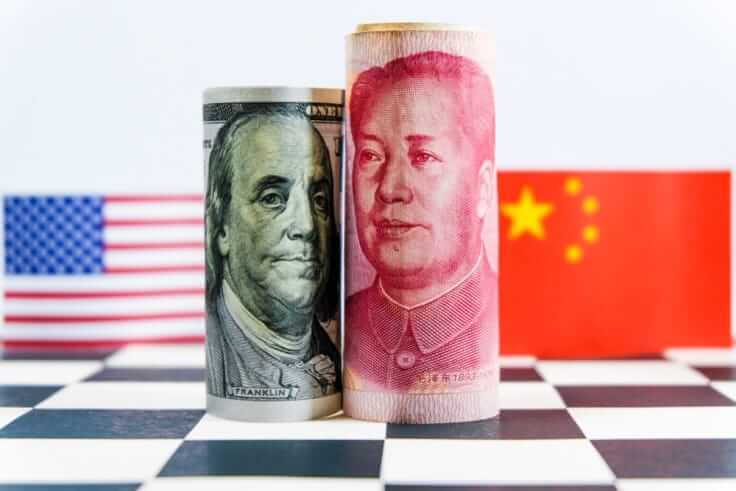
Renminbi Falls below 7: Currency War Looms
China has let its renminbi fall below the psychologically important level of 7 to the US dollar on Monday. This prompted speculations that the Asian country is using its currency as a weapon to hit back at Trump amid the escalating US-China trade war.
The last time the currency fell to below-seven levels was during the global financial crisis of 2008.
The People’s Bank of China, the country’s central bank, blamed the exchange rate’s decline on “trade protectionism.”
By midday trading, the currency slumped to 7.0267 per dollar.
This sudden drop in the currency conjured up fears of a full-blown currency war between the world’s top two economic powerhouses.
Renminbi as a Weapon
Although the move by itself doesn’t drastically alter China’s trade relations with the US, the shift could mark the start of a new front.
US President Donald Trump and other US officials have repeatedly accused China of manipulating its currency to help its exporters.
The Trump administration has slapped billions of tariffs to the Asian country. Thus, it is quite possible for the White House to view the drop in yuan as retaliation against those tariffs.
A former banker who writes about the Asian country’s financial system agrees. According to him, “It is the quiet pushback from Beijing.”
The Chinese government has tight control over the value of the renminbi. As such, the PBOC sets a midpoint around which the currency’s value fluctuates.
On Monday, the bank set the midpoint at 6.9225 per dollar. If the central bank moves the midpoint weaker, the currency will have more room to fall.
According to another analyst, this could be a huge indication that Beijing has weaponized the currency. That is, if the currency does stay lower than 7 for another day.
A Weaker Renminbi for the Trade War
In a nutshell, a weaker renminbi means Chinese factory can offset the cost of rising tariffs. Apart from that, Beijing would also see its trade surplus swell.
Just last week, Trump shook the financial markets after he announced plans for 10% tariffs on additional $300 billion worth of Chinese goods. The tariffs will be effective on September 1.
If the renminbi goes further south, the US could hit back with higher tariff rates. This would pressure Beijing to aim to reach a trade deal with Uncle Sam.
However, the move on Monday may suggest that Beijing no longer sees any prospect of hammering out a trade deal. Yet, the PBOC has tried to downplay the significance of “breaking seven.”
On Chinese Economic Front
On another front, a weaker renminbi may also hurt China.
Basically, Beijing runs the risk of seeing wealthy Chinese shift their money outside of the country. This holds weight because no investor wants to hold investments in a weakening currency.
In turn, such a shift could stunt the spending power of Chinese consumers. This would not be a pretty picture for China, which is in dire need of a boost in economic growth.
Moreover, a weaker currency could put pressure on domestic and foreign companies with dollar-denominated debt.




